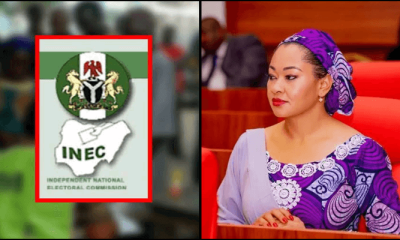Environment
Senate Makes Progress Towards Stopping Payment of Annual Rents in FCT

A bill seeking to make the annual payment of rent illegal in the Federal Capital Territory has scaled second reading in the Senate.
Tagged: “A Bill for the Regulation of Advanced Rent on Residential Apartments, Office Space” was sponsored by Senator Smart Adeyemi (Kogi West).
The lawmaker, in his lead debate on the general principles, said the bill seeks to regulate the mode of payment of rent on residential apartments, office space, rooms and accommodation in the FCT.
According to him, the move by the Senate to regulate the payment of rents in the FCT stemmed from the obligation of its constitutional responsibilities, aimed at impacting the lives of residents.
“If passed, this Bill will improve the well-being and standard of living of residents and minimize corruption and immorality emanating from the oppressive tenancy system in the Federal Capital Territory.
“This Bill will make life less stressful and less painful for majority of the down-trodden and low income earners in the Federal Territory”, Adeyemi said.
He explained further that due to global economic recession, life has become very challenging and almost unbearable for the low income earners despite the huge palliative measures by the Federal Government through the N-POWER traders money.
He noted that in the FCT, Landlords demand between one to three years advanced rent, a situation which he pointed, “automatically adds a huge burden on the masses, subsequently giving rise to desperation and corruption.”
He lamented that the “tenancy system has continuously impoverished Nigerians who are salaried employees that can only pay rent after having received their first remuneration.”
“This tenancy system is unafrican, unislamic and indeed unbiblical”, the lawmaker added.
Adeyemi expressed concern that many residents of the FCT are finding it difficult to cope with huge rent payment, adding that, “many houses built within the city center for such purposes are empty.”
He said that yearly tenancy has continued to breed corruption, moral decadence and huge inequality as low income earners who cannot afford to continually pay their rent.
According to him, some tenants now engage in corrupt practices, immorality, and even criminal acts to meet the pressing need of shelter.
He underscored the need for Legislation aimed towards justice, fairness, equity and improved standard of living.
He noted that in the FCT, a single one room apartment ranges from one million (N1,000,000) Naira to two million (N2,000,000) Naira within the city.
According to the lawmaker, in the satellite towns such as Kubwa, Nyanya, Kuje, Lugbe, rents are still not affordable for the common man as it ranges from Three hundred and fifty thousand naira (N350,000.00) to Five Hundred thousand naira (N500,000.00).
He stated that the bill, therefore, seeks to reduce advance payment for new tenants to three months and, thereafter, proceed with the monthly payment scheme.
“It also seeks to protect low income earners from any form of oppression by homeowners.
“The bill also seeks to provide a window for legal action for any form of oppression.
“Importantly, it will also serve as a safety net for Landlords against erring tenants”, he added.
Contributing to the debate, Senator Aliyu Sabi Abdullahi, while supporting the bill, described the piece of legislation as “people-centered.”
He said, “The truth is out there, many residents in the FCT are groaning under this very difficult system where people are expected to pay house rent in advance.
“With the policy where government has withdrawn participation in providing official quarters with demonetization, we are all aware, young Nigerians who are gaining employment within the precinct of the FCT for example, majority of them are actually in the outskirts.
“This is because it is extremely difficult for most of these young Nigerians to get the quantum of money that represent two years rent.
“If there is a good system as this, where on a monthly basis as the man receives his salary, he is making payment for what he has consumed, I think it will be a very good and welfare oriented system, one that is friendly to those that do not have.”
The Deputy Senate President, Ovie Omo-Agege, who presided over plenary, described the bill as “popular” owing to the number of Nigerians who have showed interest in it.
However, Senator Chimaroke Nnamani (Enugu East), a People’s Democratic Party (PDP) Senator and the only lawmaker in the chamber who spoke against the bill, argued the issue of rent payment should be driven by market forces.
“The issue of rental payment, either in advance or installments is purely economical and should be driven by market forces.
“Such market forces as availability of land, cost of building materials and income.
“If government wants to ameliorate the sufferings of the masses, government can go into housing schemes, mortgage schemes, housing credit facilities, not control the business of private individuals in an emerging African democracy.
“I, therefore, oppose, and oppose vigorously this bill”, he said.
Senators, however, voted overwhelmingly in support of the bill when the Deputy Senate President put the question for it to be read a second time.
The bill was subsequently referred by Omo-Agege to the Committee on Housing and Urban Development for further inputs. The Committee was given four weeks to report back to the Senate in plenary.
Environment
First Lady Seeks Lasting Solution to Eradicate Environmental Pollution

The First Lady, Sen. Oluremi Tinubu has called for a lasting solution to eradicate environmental pollution caused by plastic wastes.
In her message to mark the year 2025 World Environment Day, with the theme ‘Ending Plastic Pollution’, in Abuja on Thursday, the first lady also advised people to curtail the way they consume food and drinks packaged in plastics.
“I join millions of Nigerians and the world in calling for urgent and united action to safeguard our environment.
Plastic pollution has become one of the most pressing environmental challenges of our time, affecting our health, our environment, and our future.“In Nigeria, we must rise to this challenge by changing how we consume packaged food items and how we dispose of plastic containers and bags.
“I particularly want to speak to our youths, the leaders of tomorrow, be it in schools or within our neighborhoods, each of you has a role to play in creating a cleaner, healthier and greener Nigeria,” she said.
Mrs Tinubu had recently promised to introduce environmental solutions clubs to schools through her NGO, Renewed Hope Initiative (RHI).
“I want to use this opportunity to introduce our students to two programmes that the RHI will be launching soon.
“First is the Environment Club for Secondary School Students and the Environment Society for Students in Tertiary institutions nationwide to help us clean up our environment and grow more trees.
“Second is the “Flow with Confidence” for our girls in rural communities.
“This programme is to provide one year’s supply of disposable sanitary pads to our adolescent girls to support them to remain in school during their menstrual cycle,” She said.
NAN further reports that some of the functions of RHI environmental clubs in schools would include raising environmental awareness; fostering social and life skills; empowering students to take action and promoting sustainable behaviours.
The clubs can also enhance critical thinking and creativity, encourage healthy lifestyles, and strengthen communities.
The club would encourage students to participate in various environmental projects, like tree planting, recycling, and garden projects, gaining practical experience and deeper understanding.(NAN))
Environment
Billboard accident: Abia Govt. to Offset Victims’ Hospital Bills – ABSAA Official

Abia Government says it will offset the hospital bills of the Aba Billboard accident victims.
Mrs Victoria Onwubiko, Managing Director, Abia State Signage and Advertising Agency (ABSAA) made this known on Thursday in Aba at the Salad Market entrance, the site of the accident.
A big billboard fell on some passengers in five tricycles in Aba on Wednesday, following a boisterous wind, killing one person and injuring seven others.
Onwubiko said the governor had given the necessary approval for procedures regarding the victims’ treatment without hindrances.
“So, we are glad there are not going to be any more deaths; from what we have seen, the victims in the hospital are recovering and doing well.
“We understand that about eight persons were involved in the accident; five are at the Abia University Teaching Hospital, two have been discharged and one is died,” she said.
Onwubiko added that the governor had sent his Chief of Staff to the hospital for the proper management of the victims at ABSUTH, Aba.
According to her, there is no hoping that any one of them will go to the court as the state government is doing everything to take care of them.
He said ABSAA would ensure such accidents did not reoccur noting that henceforth the agency would inspect every advertising site in the state.
“We are going to ask the owners of sites like this to give us the technical drawings with which they built their sites.
“If we don’t see them, the bill board will come down for them to redo it to ensure safety,” she said.
The ABSAA MD said every site, whether high or low, which is not sound, will go down.
Mr Chinedu Nwibo, an eye-witness and a vulcaniser for tricycle operators, said there were seven persons at the entrance of the Salad Market on that Wednesday when the accident occurred.
“We were inside a little makeshift shop I had set up for my work when the rain started on Wednesday.
“The wind was very boisterous and some of the tricycle operators went into their tricycles to stay for the rain to stop.
“No sooner had they ran into their tricycles than a big iron pipe used to hoist a billboard fell on them.
“One Destiny Uguru, 27, from Izzi in Ebonyi state died from the accident while seven persons sustained injury,” he said.
Nwibo called on the government to come to the aid of the victims especially by replacing their tricycles.
“The man that lost his life has an expectant wife and two children,” he said. (NAN)
Environment
FG, Partners Urged to Act On Rangeland Conservation

The Federal Government and partners have been urged to take decisive action to protect and restore rangelands, safeguard pastoralist communities’ livelihoods, and enhance climate resilience in dryland regions.
The call was made in a communiqué issued at the conclusion of the 5th International Conference on Drylands.
The conference, themed ‘Promoting Sustainability and Resilience of Rangelands: Present and Future Outlooks’, was organised by the Centre for Dryland Agriculture at Bayero University in Kano and took place from May 6 to 8, 2025.
The three-day conference brought together over 300 participants, including scientists, researchers, policymakers, development partners, and private sector representatives.
The articipants urged governments to develop and implement comprehensive, participatory, and evidence-based legal frameworks prioritizing sustainable rangeland management.
These frameworks should recognise, protect, and support traditional knowledge and practices of pastoralists, ensuring equitable access to land and natural resources.
Secure land tenure and fair resource governance are crucial for promoting peaceful coexistence and preventing land-use conflicts.
The conference recognised the critical role of women and youths from pastoralist communities in driving resilience and sustainability.
The conference also called for increased investment in capacity building, active participation in decision-making processes, and support for income-generating opportunities and sustainable resource development projects.
The conference emphasised the need to scale up public and private sector investments in climate change adaptation strategies, sustainable land management technologies, and diversified livelihood initiatives.
These investments should be complemented by demand-driven research and the promotion of innovations that integrate indigenous knowledge with modern scientific approaches.
The conference urged international development partners and organisations to align their resources with the conference outcomes and enhance regional and global cooperation, particularly on transboundary issues.
The participants also advocated deeper engagement with global initiatives such as the Vision for Adapted Crops and Soils (VACS) and the Africa Soil Initiative.
The conference concluded that the alarming degradation of rangelands, threats to pastoralist livelihoods, and fragility of dryland ecosystems demand urgent, collaborative, and sustained action.
The participants emphasised that achieving healthy rangelands was key to food security, ecological balance, and peaceful coexistence.
The conference brought together participants from 11 African countries, 13 Nigerian states, 17 academic institutions, and several international organisations.
It created a rich platform for knowledge exchange, policy dialogue, and regional collaboration.( NAN)

























